

Want to Take Better Notes? Ditch the Laptop for a Pen and Paper, Says Science. Technology plays a critical role in how we work. Cell phones, apps, laptops, and collaboration technology have all but replaced older ways of working. Here's an interesting situation that happened to me recently, though, that has me rethinking how quickly I completely abandon old methods. It also turns out there's science behind it. Binder on the highway The other day, I led a long, full day meeting with an executive team. Do Students Lose Depth in Digital Reading? Do students learn as much when they read digitally as they do in print?
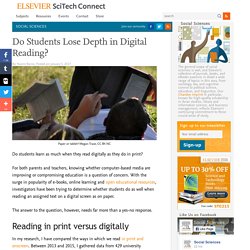
For both parents and teachers, knowing whether computer-based media are improving or compromising education is a question of concern. With the surge in popularity of e-books, online learning and open educational resources, investigators have been trying to determine whether students do as well when reading an assigned text on a digital screen as on paper. The answer to the question, however, needs far more than a yes-no response.
Reading in print versus digitally. Theconversation. Do students learn as much when they read digitally as they do in print?
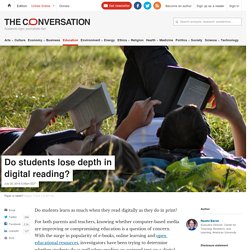
For both parents and teachers, knowing whether computer-based media are improving or compromising education is a question of concern. With the surge in popularity of e-books, online learning and open educational resources, investigators have been trying to determine whether students do as well when reading an assigned text on a digital screen as on paper.
The answer to the question, however, needs far more than a yes-no response. Reading in print versus digitally. Why Digital Reading Is No Substitute for Print. The students in my study reported that print was aesthetically more enjoyable, saying things such as “I like the smell of paper” or that reading in print is “real reading.”

What’s more, print gave them a sense of where they were in the book – they could “see” and “feel” where they were in the text. Print was also judged to be easier on the eyes and less likely to encourage multitasking. Almost half the participants complained about eyestrain from reading digitally (“my eyes burn”), and 67 percent indicated they were likely to multitask while reading digitally (compared with 41 percent when reading print). At the same time, respondents praised digital reading on a number of counts, including the ability to read in the dark, ease of finding material (“plenty of quick information”), saving paper and even the fact they could multitask while reading.
New Research Explains How The Pen Is Mightier Than The Keyboard. LIT_Blog_DTOP_BelowTitle_336x280 posted By The Literacy Site The Literacy Site In her graduate assistant days, psychological scientist Pam Mueller of Princeton University used to take notes just like everyone else in the modern age: with a computer.
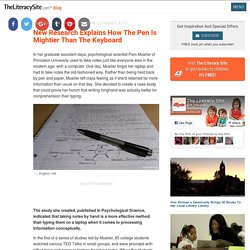
One day, Mueller forgot her laptop and had to take notes the old-fashioned way. Ncolonie / NCCS Resources. The Benefits of No-Tech Note Taking. The moment of truth for me came in the spring 2013 semester.
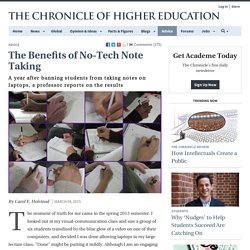
I looked out at my visual-communication class and saw a group of six students transfixed by the blue glow of a video on one of their computers, and decided I was done allowing laptops in my large lecture class. "Done" might be putting it mildly. Although I am an engaging lecturer, I could not compete with Facebook and YouTube, and I was tired of trying. The next semester I told students they would have to take notes on paper. Period. Your paper brain and your Kindle brain aren't the same thing. Would you like paper or plasma?
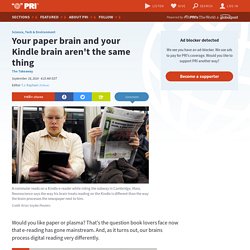
That's the question book lovers face now that e-reading has gone mainstream. And, as it turns out, our brains process digital reading very differently. Manoush Zomorodi, managing editor and host of WNYC's New Tech City, recalls a conversation with the Washington Post's Mike Rosenwald, who's researched the effects of reading on a screen. “He found, like I did, that when he sat down to read a book his brain was jumping around on the page. He was skimming and he couldn’t just settle down. Using computers widens the achievement gap in writing, a federal study finds. Can elementary-school children show off their best writing on a computer?
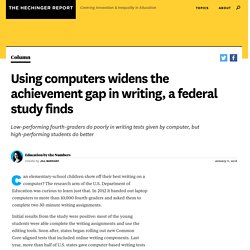
The research arm of the U.S. Department of Education was curious to learn just that. In 2012 it handed out laptop computers to more than 10,000 fourth-graders and asked them to complete two 30-minute writing assignments. How Memory, Focus and Good Teaching Can Work Together to Help Kids Learn. Everyone has a pet theory on how to improve public education: better professional development for teachers, more money, better curriculum, testing for accountability, teacher incentives, technology, streamlined bureaucracy.
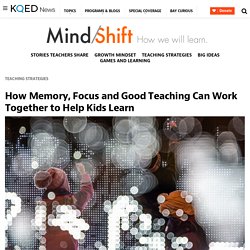
Policymakers have been trying these solutions for years with mixed results. But those who study the brain have their own ideas for improving how kids learn: focus on teaching kids how to learn. “The more you teach students how to learn, the less time you have to spend teaching curriculum because they can [understand] it on their own,” said William Klemm, senior professor of neuroscience at Texas A&M University at the Learning and the Brain conference “Making Lasting Memories.” Taking Notes: Is The Pen Still Mightier Than the Keyboard? Educators are eager to know how the computers popping up in their classrooms actually affect student learning.
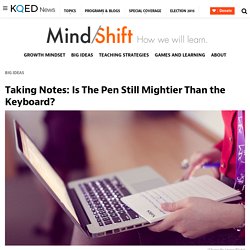
Much of the research has focused on how computers and other digital devices increase the temptation and likelihood of multitasking, leading to lower comprehension and reduced productivity. But until now, few people have looked into whether the method of note-taking a student uses, such as typing on a computer or writing in longhand, affects how well he or she comprehends the lecture. A recent study published in Psychological Science confronts the issue head-on.
Researchers Pam Mueller and Daniel Oppenheimer asked students to take notes on a 20-minute video lecture using either longhand or a computer that had been disabled for any other use. They wanted to remove the distractions that have given note-taking on computers lower marks for memory and comprehension. The Reading Brain in the Digital Age: The Science of Paper versus Screens. In a viral YouTube video from October 2011 a one-year-old girl sweeps her fingers across an iPad's touchscreen, shuffling groups of icons.
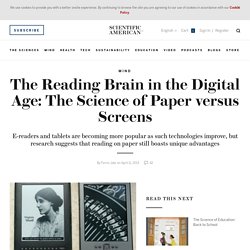
In the following scenes she appears to pinch, swipe and prod the pages of paper magazines as though they too were screens. When nothing happens, she pushes against her leg, confirming that her finger works just fine—or so a title card would have us believe. The girl's father, Jean-Louis Constanza, presents "A Magazine Is an iPad That Does Not Work" as naturalistic observation—a Jane Goodall among the chimps moment—that reveals a generational transition. "Technology codes our minds," he writes in the video's description. Five days at outdoor education camp without screens improves preteen skills with nonverbal emotion cues. 1. Introduction For several millennia, humans’ primary method for social learning and communication has been face to face. The Case Against Laptops in the Classroom. Last week, at the Aspen Ideas festival, there came an interesting little moment between Kentaro Toyama, a computer scientist, and Jim Steyer, a lawyer and entrepreneur.
Both declared that they’d banned laptops and other electronic devices in their lecture halls. “Many of the students actually appreciate that,” said Toyama, who teaches at the University of Michigan, “because it encourages real discussion, and they know that as soon as there’s a laptop in front of them, they’re going to start Facebooking each other, and that means that they’re not present for the class.” Steyer jumped right in. “You should know that in my Stanford classes five years ago, I started banning laptops,” he said. “There was no way they were paying attention. Readers win when libraries add e-books, but preserve print, as well. Linda Schlekau at the Woodrow Wilson library in Fairfax County in 2006. (Carol Guzy/The Washington Post) By Editorial Board July 10 THERE’S NOTHING like curling up with a good book after a long day — except, perhaps, sitting down with an iPad or a Kindle.
Electronic book readership has surged, and public libraries are struggling to catch up. Libraries must find a balance between building digital collections and keeping valuable print resources on the shelf. Take Notes by Hand for Better Long-Term Comprehension. News Dust off those Bic ballpoints and college-ruled notebooks — research shows that taking notes by hand is better than taking notes on a laptop for remembering conceptual information over the long term. The findings are published in Psychological Science, a journal of the Association for Psychological Science. Walk into any university lecture hall and you’re likely to see row upon row of students sitting behind glowing laptop screens. School Librarians Push for More 'Maker Spaces' Does Google Help Students Learn (or Just Think They Do?) - Inside School Research. In A Digital Chapter, Paper Notebooks Are As Relevant As Ever.